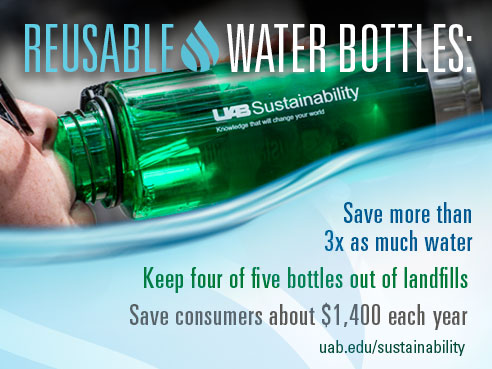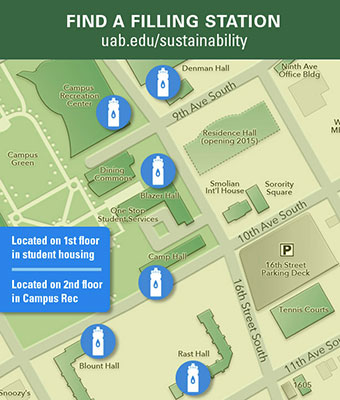 UAB Sustainability gave students the choice of a reusable water bottle or coffee cup during new student orientations this summer. Julie Price, sustainability coordinator, said it is important to start the conversation about sustainability early.
UAB Sustainability gave students the choice of a reusable water bottle or coffee cup during new student orientations this summer. Julie Price, sustainability coordinator, said it is important to start the conversation about sustainability early.
“Greeting each student and offering them a choice of these items starts a conversation about all the ways in which UAB strives to be a leader in sustainability,” Price said. “Something as simple as making the choice to use these reusable containers instead of disposable ones can have ripple effects among everyone in these students’ lives.”
Bottles can be refilled at water fountains or at any of the six water bottle refilling stations across campus. Student stations are located in Rast, Denman, Blount, Camp and Blazer halls, and the Campus Recreation Center station is accessible to everyone. The stations, added through a partnership between Academic and Student Services Operations, Energy Management and Campus Maintenance, have been used more than 300,000 times.
“We wanted to put some options in front of the students that gave them a chance to contribute to campuswide sustainability efforts,” said Carolyn Farley, director of Academic and Student Services Operations. “We started with the placement of these stations in the Campus Recreation Center and student housing, and we anticipate placing them in the new student center.”
Four outdoor refilling stations are planned for the Campus Green, intramural fields, 15th Street Greenway and Ninth Avenue Promenade at the new residence hall.
Campuswide opportunities
Students aren’t the only ones getting the new bottles and cups. Starting this fall, Sustainability will be incorporated into new employee orientation, and all new employees will be given the same choice. Price said UAB Sustainability also is working to reach professional and graduate students.
 Click to enlargeIt also is possible to install water-refilling stations in more buildings on campus.
Click to enlargeIt also is possible to install water-refilling stations in more buildings on campus.
“At this time, any department or building administrator could request that a normal drinking fountain be changed to one of these combination water fountain/water bottle refilling stations through a request to Campus Maintenance or through Hospital Maintenance, depending on the building.”
Price said the requesting department would be responsible for the purchase and cost of installation of new stations. Refilling stations cost $1,200-$1,500.
“These stations will encourage use of reusable water bottles within the UAB community and beyond, which potentially has widespread effects,” Price said. “They are handier for water bottle-refilling than regular drinking fountains, because of the angle and rate of water flow.”
What’s the harm in bottled water?
Price said reusable bottles are preferable to single-use bottles because of the energy consumed, waste generated and cost incurred:
- Energy use: About 17 million barrels of oil are used in producing bottled water each year, and about three liters of water are used to package one liter of bottled water. This does not include the fuel used to transport the product to market.
- Waste: About one in five disposable water bottles are recycled, which means about 80 percent of the single-use bottles used in the United States become waste. This past year, Americans disposed of 38 billion water bottles — about $1 billion worth of plastic.
- Cost: To consume the recommended eight glasses of water per day, it costs the consumer about 50 cents per year for tap water and about $1,400 for bottled water.
| Request a refilling station Department or building administrators can request a water bottle-refilling station be installed through Campus or Hospital Maintenance, depending on the building. The requesting department will be responsible for the purchase and cost of the station’s installation. Refilling stations cost $1,200-$1,500. |
“Sometimes people think the quality of bottled water is higher, which is not accurate,” Price said. It is interesting, she said, the United States has a high-quality and far-reaching system for guaranteeing safe drinking water, yet the population has developed a preference for bottled water despite the negatives associated with them.
Almost half of all bottled water in the United States comes from municipal water supplies, Price said. Bottled water is regulated by the Food and Drug Administration, and the testing is less frequent, less rigorous and the results are not public.
“Municipal water is subjected to rigorous, daily testing under Environmental Protection Agency directives, and the results are public,” Price said. “In fact, Birmingham Water Works’ water quality is one of the top five in the country, consistently exceeding federal drinking water standards. Using a reusable water bottle and drinking tap water supports your local water supply.”
